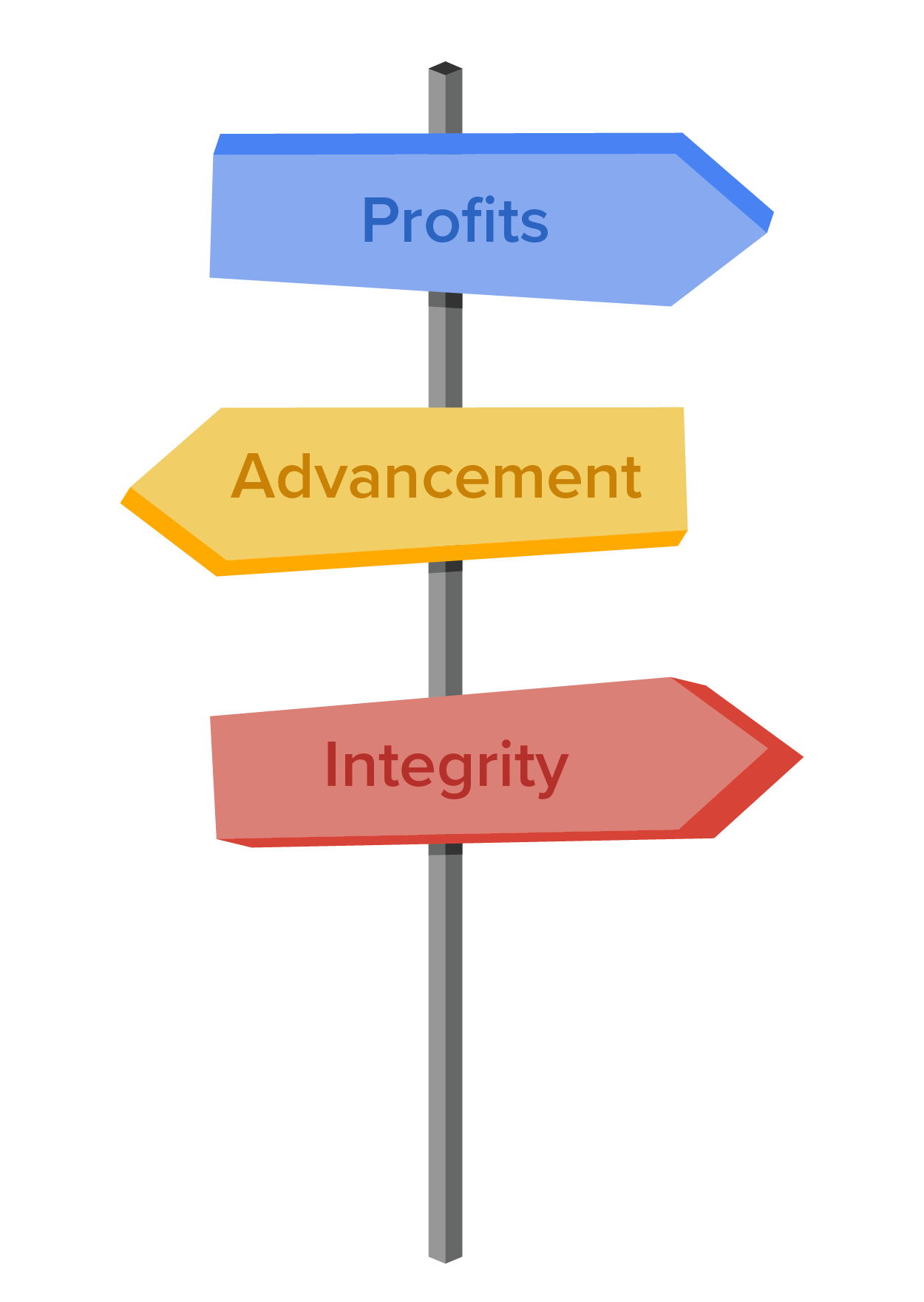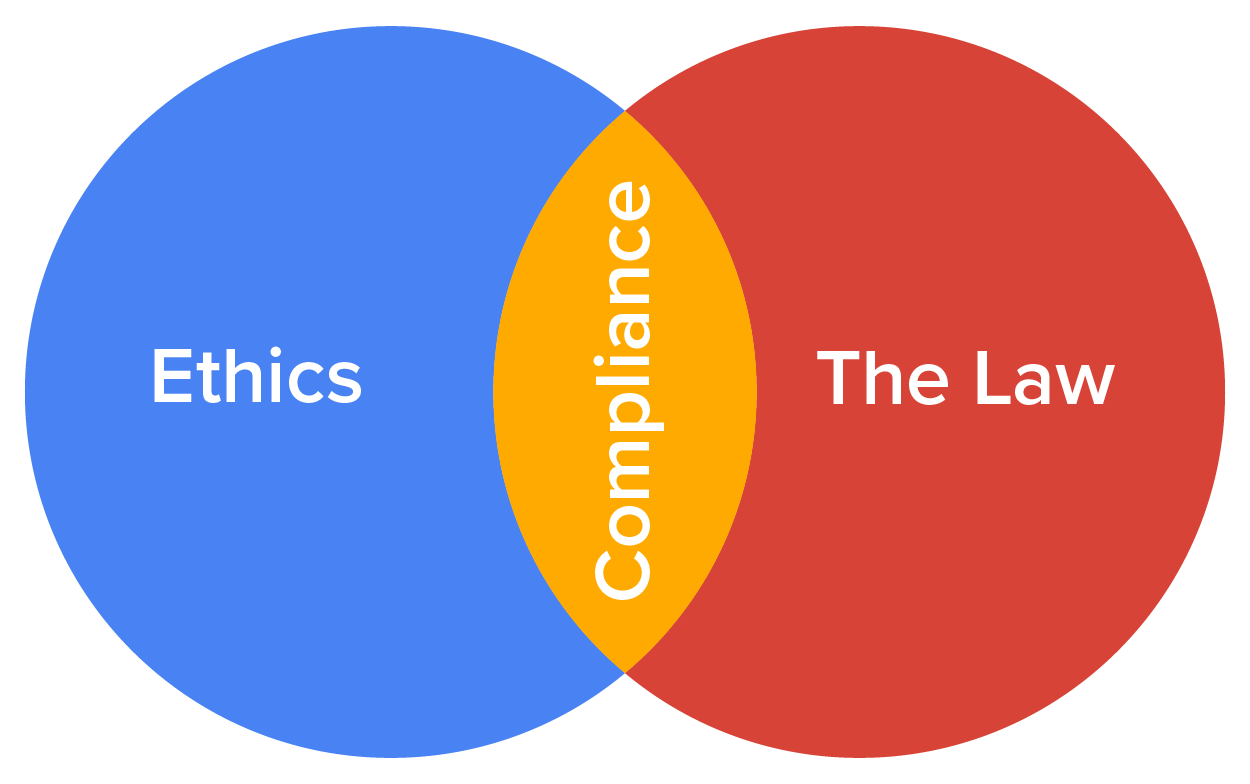Table of Contents |
Whatever ethical framework you adhere to, ethics consists of the standards of behavior to which you hold yourself in your personal and professional life. They set the levels of honesty, empathy, trustworthiness, and other virtues by which you hope to establish your personal behavior and your public reputation. In your personal life, your ethics set norms for the ways in which you interact with family and friends. In your professional life, ethics guide your interactions with customers, clients, colleagues, employees, and shareholders affected by your business practices.
Should you care about ethics in your life? In your business and profession? That is the central question you will examine in this tutorial and throughout the class. Hopefully you will come to understand why the answer is yes.

Recall that stakeholders are clients, customers, suppliers, investors, retailers, employees, the media, the government, members of the surrounding community, competitors, and even the environment; that is, they are individuals and entities affected by the business’s decisions.
Stakeholders typically value a leadership team that chooses the ethical way to accomplish the company’s legitimate for-profit goals. For example, the clothing company Patagonia expresses its commitment to environmentalism via its “1% for the Planet” program, which donates 1% of all sales to help save the planet. In part because of this program, Patagonia is a market leader in outdoor gear, as consumers increasingly value cause-based marketing and social responsibilities as important factors in their purchase decisions.
Being successful at work may therefore consist of much more than simply earning money and career promotions. It may also mean treating your employees, customers, and clients with honesty and respect. It may come from the sense of pride you feel about engaging in honest transactions, not just because the law demands it, but because you demand it of yourself. It may lie in knowing the profit you make does not come from shortchanging others. Thus, business ethics guide the conduct by which companies and their agents abide by the law and respect the rights of their stakeholders, particularly their customers, clients, employees, and the surrounding community and environment. Ethical business conduct permits you to sleep well at night and stand in the bright lights of the media during the day. As the old saying goes, “Lies and half-truths will be forced from the shadows and into the light.” Again and again, you can observe that when companies seek to hide the truth, it eventually comes out, often with a much higher cost. For example, Nestlé, the original owner of Arrowhead Mountain water, was sued via a class action suit, which was dismissed but left bad publicity for the company. The suit alleged that the mountain on the water bottle was false advertising, because the water isn’t actually from “Arrowhead Mountain” as the label states. Such a lawsuit, despite it being dismissed, speaks to the reasons to focus on truth-telling by companies in their business dealings and also in their marketing (Bradley-Smith, 2021).
Nearly all systems of religious belief stress the building blocks of engaging others with respect, empathy, and honesty. These foundational beliefs, in turn, prepare people for the codes of ethical behavior that serve as ideal guides for business and the professions. Still, one need not subscribe to any religious faith to hold that ethical behavior in business is still necessary. Just by virtue of being human, all people share obligations to one another, and principal among these is the requirement that one treat others with fairness and dignity, including in commercial transactions. Businesses recognize they are part of the community and share responsibilities. The ethics and ethical actions, from corporate sponsorship to volunteer days, of an organization are valued by consumers. They make purchase decisions, in part, based on their perception of business moral and ethical actions. Corporate reputations are highly prized for good reason. Ethical actions are part of good business.
For this reason, the words ethics and morals can usually be used interchangeably. An “ethical person” conveys the same sense as a “moral person,” since religious belief is not a requirement for acting ethically in business and the professions. Because all people are humans and in the same world, you should extend the same consideration to strangers as you do to the people in your community. It is the right way to behave, but it also burnishes your own professional reputation as a business leader of integrity.
Integrity—that is, unity between what one says and what one does—is a highly valued trait. One well-known definition of integrity is “doing the right thing when no one is watching.” Acting with integrity means you adhere strongly to a code of ethics, so it implies trustworthiness and incorruptibility. Being a professional of integrity means consistently striving to be the best person you can be in all your interactions with others. It means you practice what you preach, walk the talk, and do what you believe is right based upon reason. Businesses and organizations that act in ethical ways even when no one is watching often build their reputations, which directly supports their relationships with consumers and communities. Integrity in business brings many advantages, not the least of which is that it is a critical factor in allowing business and society to function properly.
Successful corporate leaders and the companies they represent will take pride in their enterprise if they engage in business with honesty and fair play. To treat customers, clients, employees, and all those affected by a firm with dignity and respect is ethical. In addition, laudable business practices serve the long-term interests of corporations. Why? Because customers, clients, employees, and society at large will much more willingly patronize a business and work hard on its behalf if that business is perceived as caring about the community it serves. And what type of firm has long-term customers and employees? One whose track record gives evidence of honest business practices.
Many people confuse legal and ethical compliance. They are, however, somewhat different and call for different standards of behavior. The concepts are not interchangeable in any sense of the word. The law is needed to establish and maintain a functioning society. Without it, society would be in chaos. Compliance with these legal standards is strictly mandatory: If you violate these standards, you are subject to punishment as established by the law. Therefore, compliance in terms of business ethics generally refers to the extent to which a company conducts its business operations in accordance with applicable regulations, statutes, and laws. Yet this represents only a baseline minimum. Ethical observance builds on this baseline and reveals the principles of an individual business leader or a specific organization. Ethical acts are generally considered voluntary and personal, and are based on one’s values and character.

Some professions, such as medicine and the law, have traditional codes of ethics, or standards of professional behavior. The Hippocratic Oath, for example, is embraced by most professionals in health care today as an appropriate standard always owed to patients by physicians, nurses, and others in the field. This obligation traces its lineage to ancient Greece and the physician Hippocrates (460 BCE–370 BCE) and is perhaps the oldest known code of ethics.
Doctors and lawyers must live by their professional code or are no longer allowed to practice. Unlike those professions, business does not have a mutually shared code of ethics. This is changing, however, as evidenced by the array of codes of conduct and mission statements many companies have adopted over the past century. At a company level, a code of conduct is a set of rules which states that employees refrain from acting in a manner contrary to the employer’s interest. (This will be discussed in detail in Unit 2). These codes have many points in common, and their shared content may eventually produce a code universally claimed by business practitioners. What central point might constitute such a code? Essentially, a commitment to treat with honesty and integrity customers, clients, employees, and others affiliated with a business.
The law is typically indebted to tradition and precedence, and compelling reasons are needed to support any change. Ethical reasoning often is more topical and reflects the changes in consciousness that individuals and society undergo. Often, ethical thought precedes and sets the stage for changes in the law.
Behaving ethically requires that you meet the mandatory standards of the law, but that is not enough. For example, an action may be legal that you personally consider unacceptable. For example, breaking a promise on a deadline to a client is not illegal but is probably unethical according to most people. Companies today need to be focused not only on complying with the letter of the law but also on going above and beyond that basic mandatory requirement to consider their stakeholders and do what is right.
Source: THIS TUTORIAL HAS BEEN ADAPTED FROM OPENSTAX "BUSINESS ETHICS". ACCESS FOR FREE AT OPENSTAX.ORG/BOOKS/BUSINESS-ETHICS/PAGES/1-INTRODUCTION. LICENSE: CREATIVE COMMONS ATTRIBUTION 4.0 INTERNATIONAL.
REFERENCE
Bradley-Smith, A. (2021, October 28). Arrowhead Water Class Action Accusing Nestlé Tossed by 9th Circuit. Top Class Actions. topclassactions.com/lawsuit-settlements/lawsuit-news/nestle-class-action-lawsuit-and-settlement-news/arrowhead-water-class-action-accusing-nestle-tossed-by-9th-circuit/